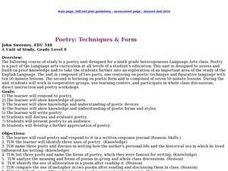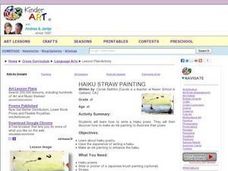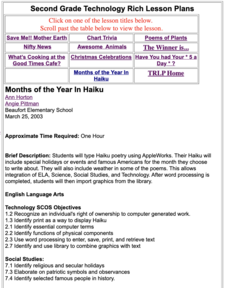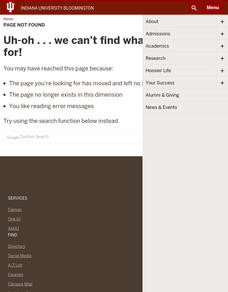Curated OER
Haiku - Poetry of the Samurai Warrior
Learners research the Samurai and their Haiku Writings. Students use internet research to gather information about the ancient Japanese Samurai. The learners then create individual Haiku writings, and a cultural day is designated when...
Curated OER
Japanese Culture
First graders research information about Japanese people and culture. They read a Japanese story listening for rhyme schemes. They create their own rhyme schemes. They discuss Japanese food and sample rice cakes. They read Haiku and then...
Curated OER
Korean Sijo
Middle schoolers investigate the concept of Sijo as a form of poetry. They compare it to other forms of poetry in the interest of pointing out unique characteristics of Sijo. They use the research information in order to compose their...
Curated OER
Haiku
Learners explore the Japanese literature, music and art. Pupils discuss the culture of Japan. While listening to Japanese music, they write and illustrate a Haiku. Students are given the opportunity to create origami.
Curated OER
Japanese Tanka
Students compare and contrast the two forms of poetry. They are concerned with practicing the styles of both in order to reproduce their own creative work. Research is done to look for the backgrounds of both styles and how they emerged.
Curated OER
Japanese Haiku and the American Experience
Twelfth graders research the history to Haiku Poetry. They read classical haiku to comprehend their special sensibility and form. Students encounter the Buddhist philosophical background of this poetry and its roots. They write original...
Curated OER
In Cell-A-Bration of Cells
Sixth graders identify major cell organelles found in both animal and plant cells. Pupils observe a PowerPoint presentation based upon the features of a haiku. They create haiku science-based poem which describe the characteristics of...
Curated OER
Unrhythmic, Culturally Diverse, Simple Forms of Poetry
Students write an example of each of the three poetry styles (haiku, cinquain, and diamante) and they see that not all poetry rhymes.
Curated OER
Poetry to the Core
Second graders examine several examples of poetry in the six lessons of this unit. The lessons focus on five poetic forms, couplets, quatrains, limericks, Haiku, and free verse.
Curated OER
Haiku: Observation and Writing in the Japanese Garden
Young scholars observe a Botanical Gardens. Upon returning to the classroom, students write their own Haiku based on their observations.
Curated OER
Poetry: Techniques & Form
Ninth graders explore poetic technique and figurative language in this ten lesson unit. Comparisons are made between a variety of forms of poetic expressions and the lives of several poets are studied.
Curated OER
Deciphering the Mechanics of Poetry
Eighth graders analyze a variety of poems to develop the ability to recognize and explain a variety pf poetic devises.
Curated OER
Gyotaku Lesson Plan
Students examine and discuss the history and process of Gyotaku, or fish prints. They view images of Gyotaku, create a fish print, and write a haiku.
Curated OER
Poetry
Fifth graders are introduced to poetry and many authors who create it. In this language arts lesson, 5th graders create a class poetry book. Each student submits an original poem, along with an illustration.
Curated OER
The Nature of Haiku Poetry
Students brainstorm elements of nature art prints and photos. They identify the syllable count of Haiku and take a nature walk. They write Haiku poems while practicing the use of simile, alliteration, metaphor, and analogy to describe...
Curated OER
Powerful Poetry
Students examine Haiku poems and analyze their meanings. They create a whole class Haiku, then develop their own poems.
Curated OER
Haiku Straw Painting
Students explore haiku poetry, have the experience of writing a haiku, and make an ink painting to enhance the haiku.
Curated OER
Months of the Year In Haiku
Learners type Haiku poetry using AppleWorks, including special holidays or events and famous Americans for the month about which they choose to write.
Curated OER
The Poetry Of Chinoiserie
Pupils examine works of art that incorporate Asian export objects, and then respond to them using Japanese haiku poems. discuss the subject and meaning in a work of art. They explain the basic ideas behind Japanese haiku poetry.
Curated OER
Honey Bee Language Arts And Literature
Young scholars see how nature and honey bees are presented in literature. They find and read poetry that include references to bees. Have them write their own poetry or Haiku.
Curated OER
Haiku
Students lie in the grass on their backs for fifteen minutes. They let go of any inner dialogue and simply see, feel, hear, and smell. When the time is over, students write down words about what they experienced.
Curated OER
The Emperor and the Kite
Fourth graders explore storytelling by reading a classic story. In this vocabulary identification lesson, 4th graders read the story The Emperor and the Kite and define the different vocabulary terms that appear in the story. Students...
Curated OER
Book Report Haiku
Students study another method for writing a book report using a Haiku poem. In this book report lesson, students use the Haiku poem format to write a book report.

























